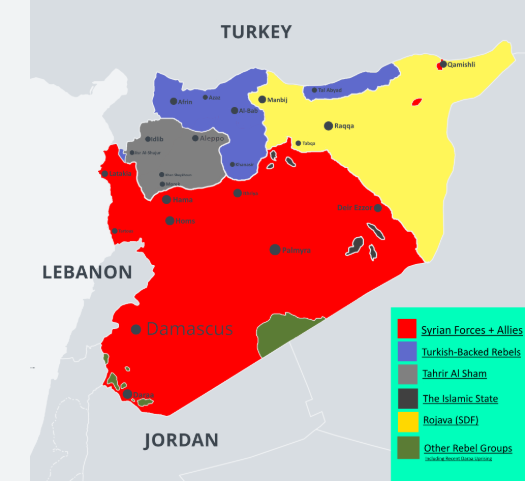Virendra Pandit
New Delhi: As the 13-year-old civil war in Syria flared up again last week with Sunni insurrection, supported by Turkey and others, the pro-Iran Shia regime in Damascus, led by President Bashar Assad, is facing an existential crisis.
This fresh development is being viewed as yet another attempt by the Sunni nations to cripple the Shia regime of the Ayatollahs in Tehran which has suffered heavily because of Israel almost dismantling its proxy, the Hezbollah terror infrastructure in Lebanon in recent weeks.
The Sunni insurgents, led by Hayat Tahrir al-Sham (HTS) fighters and other Islamists got a boost from Turkish backing and Ankara’s desire to topple the Kurds separatists in the region, the media reported.
Reports suggested that the reignition of the Syrian civil war was anticipated as Turkish President Recep Tayyip Erdogan and his Sunni Islamist partners had already been talking about it, after the Kurds went against Ankara, with support from Damascus.
The Kurds control the northeastern Rojava, also known as the Autonomous Administration of North and East Syria (AANES), since the civil war began in 2011, to the chagrin of Turkey.
While Syrian President Bashar Assad and his allies Hezbollah and Iran weakened considerably since Israel’s all-out war not only against the Tehran-supported Sunni terror outfit Hamas in the Gaza Strip but also Hezbollah in Lebanon, Russia, which aided Syria so far, seems reluctant. Moscow has primarily been busy against Ukraine. Although Russia still maintains military bases in Syria but has reduced the number of fighter jets from 50 to 13 now—and only seven of these are operable.
Supporting the Sunnis, the US is trying to reposition itself in the Middle East. However, it is unclear if Donald Trump’s administration, taking office in Washington next month, would continue with this Biden policy.
Seeing in this uncertainty an opportunity, Syrian Sunni rebels relaunched their offensive against the Assad regime on November 27 and captured Aleppo, Syria’s second-largest city. Now they are expanding the campaign into other nearby cities, with help from the Islamist Hayat Tahrir al-Sham (HTS), a regional group formerly allied with Al-Qaeda. The US designated HTS as a terrorist organization in 2018.
When Syria’s civil war began in 2011, Ankara sided with the rebels, breaking off all diplomatic relations with Damascus. More recently, President Erdogan tried to revive diplomatic ties but Assad rejected it unless Turkish troops are withdrawn from northern Syria.
But Turkey is not willing to withdraw its troops from what it calls a “security zone” in northern Syria, which Ankara controls with the help of its proxy Syrian National Army (SNA).
According to reports, Turkey is aiming to topple the Kurdish Autonomous Administration of North and East Syria which the Democratic Union Party (PYD), an offshoot of the banned Kurdistan Workers’ Party (PKK), controls.
For the record, however, Ankara has denied any involvement in Syria, with its Foreign Minister Hakan Fidan saying Turkey would never support activities that could spark another flood of refugees. Turkey has already been flooded with around 3.5 million Syrian refugees since the war began.
This migration impacted Turkey’s economy and the recent municipal and parliamentary elections, putting President Erdogan under huge pressure and forcing him to promise to send these refugees back to the buffer zone in northern Syria. Erdogan recently repeated his intention to maintain control of the 30-40 kilometers (19-25 miles) of this strip.
Since the last weekend, the Turkish-allied Sunni Islamists tasted success against the Kurds. While Ankara is supporting the current Sunni offensive, it is also trying to avoid a direct conflict with Russia, Iran, and the Assad regime.
The Turkish army started major military operations in the region in 2016 bombarding Kurdish-controlled areas in North Syria from its bases in Jarabulus, al-Bab, A’zaz, Tell Abyad, and the rebel stronghold Idlib.

